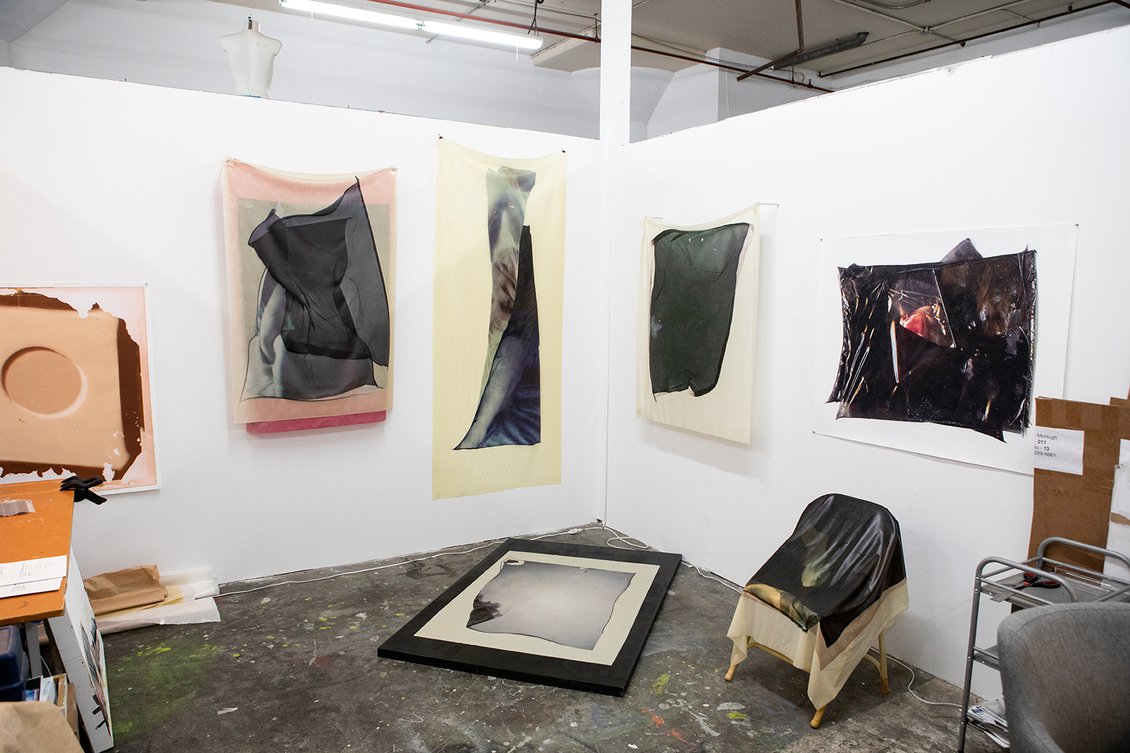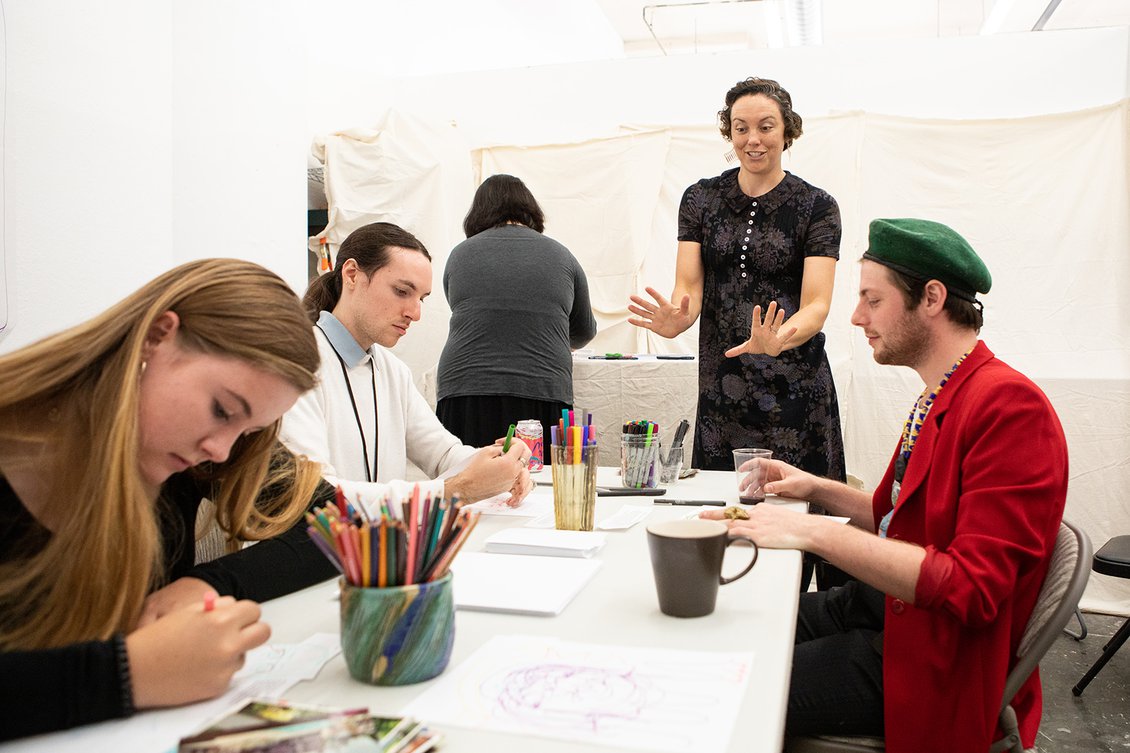Fine Arts: Fine Arts, MFA
About
Expand your creative practice
The graduate program in Fine Arts attracts an international cohort of emerging artists to work with renowned faculty and distinguished visitors in the culturally diverse San Francisco Bay Area. Positioned within one of the top art and design colleges in the country, the two-year MFA program is characterized by a culture of critique, studio making, and social engagement. The program supports interdisciplinary practices across a variety of artistic mediums and discourses. The degree is in Fine Art, rather than in a specific medium, and students work across a broad range of forms including painting, sculpture, photography, print media, moving image, social practice, and installation. The program provides its students with the community, intellectual tools, and hands-on experience to meaningfully participate in a wide range of contemporary art contexts, both during the course of study and after graduation.
Study in the culturally diverse Bay Area
Known for its long history of political activism and radical thinking, the Bay Area remains an epicenter of diverse and socially progressive ways of making art and imagining creative participation. Located in the heart of San Francisco, the graduate program in Fine Arts is part of an extraordinary ecosystem of art institutions—from alternative artist-run venues, to nonprofit and commercial galleries and major museums, including the college’s own premier exhibition space, the CCA Wattis Institute for Contemporary Arts. The curriculum is designed to encourage students to engage these resources and communities, exploring the opportunities afforded outside the studio and seminar room walls.
Immerse yourself in an artistic community
Every full-time, in-residence MFA student making satisfactory academic progress is provided a private studio in which to work. The program’s graduate studios are located on the third and fourth floors of Hooper Tower. The studios are home to the graduate program and feature reserved space for critiques, a shared kitchen, a small lounge, and a resource hub for quick access to hand tools for installation to support work and creative growth in all artistic forms.
Note: Studio space is provided to dual-degree students in MFA Fine Arts and MA Visual & Critical Studies for four continuous semesters and one summer session in the first two years of their studies. In their third and final year, dual-degree students are eligible for shared studio space (typically, two students per studio) for their two remaining consecutive semesters, if space is available.

Tailor your course of study
The program supports a wide range of interdisciplinary practices, discourses, and histories. Individual studio critique, the core curriculum, and a wide range of open electives across fields encourage experimentation and individualized in-depth research.
Collaborate with visiting artists
Close contact and collaboration with a wide range of visiting artists complements the curricular work done with program faculty. Each year, a distinguished artist teaches a month-long Residency Intensive, and the Larry Sultan Visiting Artist Program brings prominent photographers and media artists to give public presentations and engage with students annually. Recent visitors have included Judith Butler, Jibade-Khalil Huffman, Shannon Ebner, Lyle Ashton Harris, Mickalene Thomas, An-My Lê, Nairy Baghramian, Ralph Rugoff, Collier Schorr, Tania Bruguera, Deana Lawson, Walid Raad, Thomas Demand, and Kai Althoff.
Make socially engaged art
The theory and practice of social engagement is a central, distinctive ethos of the MFA Fine Arts program. As home to the nation’s first Social Practice program, CCA’s graduate studies supports social engagement throughout the MFA curriculum as well as a specialized social practice workshop that focuses on urban environments, regional communities, research-based practice, or institutional structures.

Active professional artists, writers, and curators
The program’s distinguished faculty is composed of internationally active artists, critics, curators, and scholars. The faculty’s vast experience working with institutions and communities in many diverse art worlds gives Fine Arts graduate students a wide collective pool of expertise from which to draw as they formulate and refine their own individuated artistic position.
Chair Susanne Cockrell is an interdisciplinary artist working in the areas of social practice and time-based media for over 35 years. Her social and documentary projects consider the ways people live into specific places over time, amplifying the emergent choreography of landscape, shared experience, and participatory actions in shaping collective and civic life. Early research in experimental dance, environmental studies, and eastern philosophy continue to shape her craft with an attention to ephemeral encounters and poetics of daily life. Fieldfaring Projects, in collaboration with Ted Purves from 2002–17, asked questions about systems of critical exchange, collectivity and land use in the urban landscape through the lens of informal social economies and rural aesthetics. This 15-year body of work was directed toward ways that people come together in social and public contexts.
A graduate of the MFA program in 1993, Professor Cockrell began teaching at CCA in 2003. She served as coordinator of the Pre-College Program, assistant chair of the First Year Program, chair of the Community Arts Program, and interim chair of the Sculpture and Individualized Studies programs. She is core faculty for the graduate Social Practice Workshop and founded the Social Practice and Community Engagement (SPACE) Minor. She coordinated the Ecological Practices Minor, co-founded and coordinated the Oakland Campus Community Edible and Dye Garden, and is an active member of the CCA Oakland Campus Legacy Committee. She served on CCA’s Curriculum Committee, is a founding member of the Decolonial School, and has been an active member of the Graduate Fine Arts Advisory Committee for many years.
Careers
MFA Fine Arts graduates participate in a wide variety of contemporary art contexts after they leave the program. They use their skills as socially engaged artists and thinkers to establish international careers as practicing professional artists, as well as to pursue an expansive array of other paths, including establishing their own collectives and exhibition spaces, teaching, critical writing, and arts administration. Notable recent alumni include Diedrick Brackens, Toyin Ojih Odutola, Sarah Hotchkiss, Carmen Winant, Zarouhie Abdalian, and Suné Woods.
Potential career paths
- Visual artist
- Writer and critic
- Curator
- Photographer
- Filmmaker
- Educator
- Community activist
- Researcher
- Arts administrator
Diversity, Equity, Inclusion, and Belonging
Diversity, Equity, Inclusion, and Belonging Statement
The Graduate Fine Arts Program embraces a conception of art making as a vital and self-critical means of knowledge production and engagement with others. As a committed endeavor of individual action and global citizenship, art can embrace difficult issues and propose alternative ways of being. In support of this model of art, our program explicitly regards diversity—of perspectives, lived experiences, and methodologies—as a prerequisite of an artistic community engaged in reflective thought and cultural production.
The Graduate Fine Arts Program is committed to diversity and equity in the myriad modes of making our Program supports, including fostering open, informed discussion—--and critique—--as a foundation of our studio-based making culture. Within this framework of exchange, we actively seek to build an inclusive community that supports and values diversity and intersectional identity throughout our communal decisions and actions, while recognizing this is on-going work that must be flexible and responsive.
This work actively unwinds inequality created on structural and interpersonal levels. The anti-racist and anti-discriminatory work in which we engage is collective and individual at the same time. In Graduate Fine Arts, we actively cultivate de-centered rather than hierarchical power structures in all learning interactions, coursework, and Programmatic decisions. The Graduate Fine Arts program also recognizes the gaps and inequity driving external art worlds as well, and seeks to contribute to a tipping point that reinvents how culture manifests in society.
To this end, we follow CCA’s college-wide commitment to increase racial, socioeconomic, and global diversity among students, staff, and faculty. We develop our pedagogy and curriculum to reflect social and cultural diversity, and work to build a campus community that supports and values diversity.
CCA campuses are located in Huichin and Yelamu, also known as Oakland and San Francisco, on the unceded territories of Chochenyo and Ramaytush Ohlone peoples.
This statement was collectively authored by the Graduate Advisory Council and is a work in progress.
